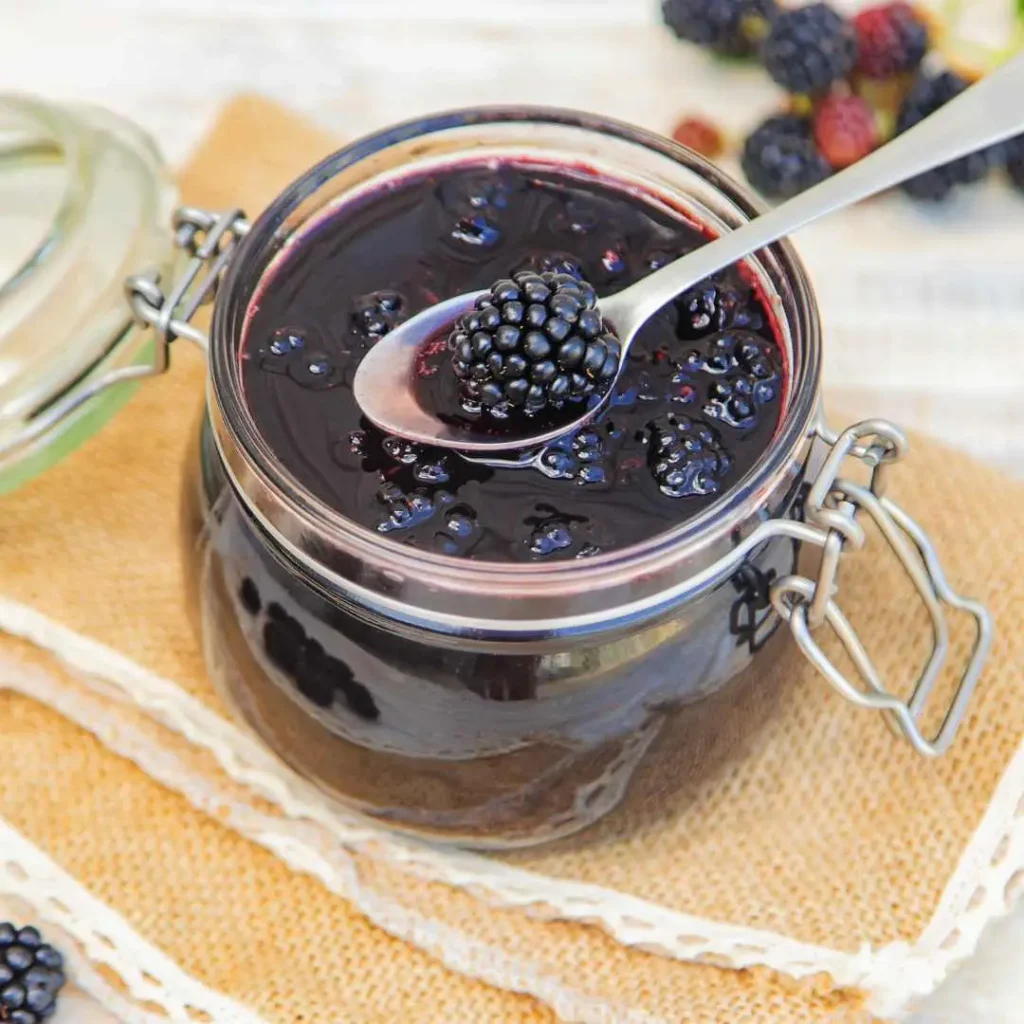Making mulberry jam is a fun and rewarding process that allows you to enjoy the sweet flavor of mulberries all year long. Whether you have fresh mulberries from your garden or frozen ones from the store, this guide will walk you through the steps to create your own delicious jam. With just a few simple ingredients and some basic tools, you can make a tasty spread that’s perfect for toast, desserts, or even savory dishes. Let’s dive into the world of mulberry jam!
Key Takeaways
- Mulberries are nutritious and packed with vitamins, making them a healthy choice for jam.
- You can use either fresh or frozen mulberries for making jam, which makes it easy to enjoy any time of year.
- Liquid pectin is recommended for thickening the jam, as mulberries are low in natural pectin.
- Canning your jam allows you to store it for up to a year, so you can enjoy it long after mulberry season ends.
- Experiment with your jam by adding spices or mixing in other fruits for unique flavors.
Understanding Mulberries and Their Benefits
Mulberries are not just delicious; they are also packed with nutrients. These little berries are rich in vitamins and antioxidants that can benefit your health in many ways. Here’s a closer look at what makes mulberries special.
Nutritional Value of Mulberries
Mulberries are a powerhouse of nutrition. In a 100-gram serving, they provide:
| Nutrient | Amount per 100g | Daily Value (%) |
|---|---|---|
| Vitamin C | 61% | 61% |
| Iron | 23% | 23% |
| Vitamin K | 10% | 10% |
Health Benefits of Mulberries
Eating mulberries can offer several health benefits:
- Rich in antioxidants: They contain resveratrol, which may help protect your heart.
- Supports immune health: The high vitamin C content boosts your immune system.
- May improve digestion: Their fiber content aids in digestion and keeps you regular.
Choosing the Right Mulberries for Jam
When selecting mulberries for your jam, consider the following:
- Look for ripe berries: They should be dark and plump.
- Check for freshness: Avoid any that are mushy or have mold.
- Consider frozen options: If fresh ones are hard to find, frozen mulberries work well too.
By understanding the benefits and characteristics of mulberries, you can make the most of this delightful fruit in your jam-making adventures!
Essential Equipment for Making Mulberry Jam
To make delicious mulberry jam, you need the right tools. Here’s a list of essential equipment:
Canning Tools You Will Need
- Water Bath Canner: This is crucial for sealing your jars properly.
- Canning Jars: You’ll need about 6 to 8 jars, preferably 8-ounce size.
- Lids and Bands: Make sure you have enough lids to seal your jars.
Sterilizing Your Jars
Before you start making your jam, it’s important to sterilize your jars. You can do this by:
- Boiling the jars in water for 10 minutes.
- Placing them in a hot oven at 200°F (93°C) for 10 minutes.
- Using a dishwasher on the hot cycle.
Alternative Tools for Jam Making
If you don’t have traditional canning tools, you can still make jam with:
- A large pot for cooking the jam.
- A ladle for filling jars.
- A funnel to avoid spills when pouring jam into jars.
Gathering and Preparing Your Ingredients
Selecting Fresh or Frozen Mulberries
When making mulberry jam, you can use either fresh or frozen mulberries. Here are some tips for selecting the best ones:
- Fresh Mulberries: Look for berries that are plump and dark in color. Avoid any that are mushy or have mold.
- Frozen Mulberries: If using frozen, ensure they are unsweetened and have been stored properly to maintain their flavor.
The Role of Pectin in Jam Making
Pectin is a natural thickener that helps your jam set. Here’s what you need to know:
- Types of Pectin: You can use liquid or powdered pectin. Each has its own instructions, so check the package.
- No-Pectin Options: If you prefer a more natural approach, you can make jam without added pectin by using ripe fruit and cooking it longer to achieve the right consistency.
Balancing Sugar and Acidity
Getting the right balance of sugar and acidity is crucial for delicious jam. Here’s how:
- Sugar: It not only sweetens but also helps preserve the jam. A common ratio is 1 cup of sugar for every cup of fruit.
- Acidity: Adding lemon juice can enhance flavor and help with preservation. Aim for about 1 tablespoon of lemon juice per cup of fruit.
- Taste Test: Always taste your mixture before canning to ensure it’s to your liking.
Step-by-Step Guide to Making Mulberry Jam
Preparing the Mulberries
To start, you need to wash the mulberries thoroughly. Remove any leaves, sticks, or bugs. You can leave the small stems on, as they will cook down. Once cleaned, place the mulberries in a medium-sized saucepan.
Cooking the Jam Mixture
- Add Sugar and Lemon Juice: Pour in 6 cups (1.35 kilograms) of granulated sugar and 1/2 cup (120 milliliters) of freshly squeezed lemon juice. This will help balance the sweetness and acidity.
- Heat the Mixture: Turn the heat to medium and stir the mixture until the sugar dissolves. Bring it to a boil, then reduce the heat and let it simmer.
- Add Pectin: After about 15 minutes, add 1 packet of liquid pectin. Stir well to combine and let it cook for a few more minutes until it thickens.
Canning and Storing Your Jam
- Prepare Your Jars: While the jam is cooking, sterilize your jars by washing them with warm water and soap. This is important to keep your jam safe for storage.
- Fill the Jars: Once the jam is ready, ladle it into the sterilized jars, leaving about 1/4 inch of space at the top.
- Seal and Process: Wipe the rims of the jars with a clean cloth, add the lids, and tighten them. Process the jars in a boiling water bath for 10 minutes to seal them properly.
Tips and Tricks for Perfect Mulberry Jam
Achieving the Right Consistency
To make sure your mulberry jam turns out just right, follow these tips:
- Use liquid pectin for better mixing and results.
- If you prefer a smoother texture, consider using an immersion blender after cooking.
- Skim off any foam that forms on the surface while cooking, or stir in a teaspoon of butter to reduce it.
Avoiding Common Mistakes
Here are some common pitfalls to avoid:
- Don’t skip washing the mulberries thoroughly to remove any debris or pests.
- Be careful not to overcook the jam, as it can become too thick.
- If your jam doesn’t set, you can re-cook it with more pectin.
Creative Variations and Add-Ins
Feel free to experiment with your jam:
- Add spices like cinnamon or nutmeg for a unique flavor.
- Mix in other fruits, such as strawberries or blueberries, for a delicious twist.
- Consider adding a splash of lemon juice to enhance the flavor.
Serving Suggestions for Mulberry Jam
Pairing with Breakfast Foods
Mulberry jam is a delightful addition to your breakfast table. Here are some tasty ways to enjoy it:
- Spread it on toast or bagels for a sweet start to your day.
- Mix it into yogurt for a fruity twist.
- Use it as a topping for pancakes or waffles.
Using Mulberry Jam in Desserts
You can also incorporate mulberry jam into your favorite desserts. Consider these ideas:
- Swirl it into cheesecake batter before baking for a fruity flavor.
- Use it as a filling for cookies or pastries.
- Drizzle it over ice cream or pudding for a sweet treat.
Incorporating Jam into Savory Dishes
Don’t forget that mulberry jam can enhance savory meals too! Here are some suggestions:
- Glaze meats like chicken or pork with mulberry jam for a sweet and tangy flavor.
- Mix it into salad dressings for a unique twist.
- Serve it alongside cheese for a delicious appetizer.
Final Thoughts on Making Mulberry Jam
In conclusion, making mulberry jam is a fun and rewarding experience that anyone can enjoy. With just a few simple ingredients and steps, you can create a delicious spread that brightens up your breakfast or snacks. Remember to choose ripe mulberries, and don’t worry too much about the tiny stems; they cook down nicely. Whether you decide to can your jam or freeze it for later, you’ll love the sweet and tangy flavor that mulberries bring. So gather your ingredients, follow the steps, and savor the taste of homemade mulberry jam!
Frequently Asked Questions
How do I remove the stems from mulberries?
It’s tough to pick mulberries without getting some stems attached. You can cook them with the stems on, or if you want, you can cut them off with scissors.
Are mulberries high in pectin?
Mulberries are not very high in pectin. Most types are low in pectin, but some kinds, like the Superberry Black Mulberry, have more.
What can I do with mulberries besides making jam?
You can use mulberries in many ways! Put them in baked goods, mix them into pancake batter, or even add them to drinks.
How can I keep my mulberry jam fresh?
If sealed properly, your mulberry jam can last up to a year in a cool, dark place. Just make sure the jars are sealed well.
Can I use frozen mulberries for this recipe?
Yes! Frozen mulberries work great for making jam. Just thaw them before you start cooking.
What if my jam doesn’t thicken?
If your jam doesn’t thicken, it might be because mulberries are low in pectin. You can add more pectin to help it set.



